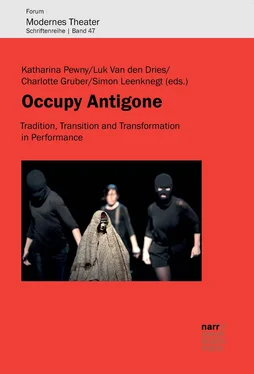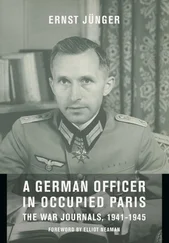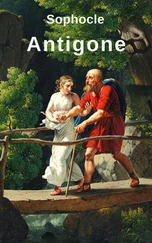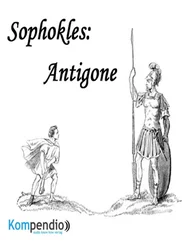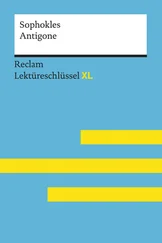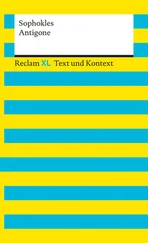Occupy Antigone
Tradition, Transition and Transformation in Performance
Charlotte Gruber / Katharina Pewny / Luk Van den Dries / Simon Leenknegt
A. Francke Verlag Tübingen
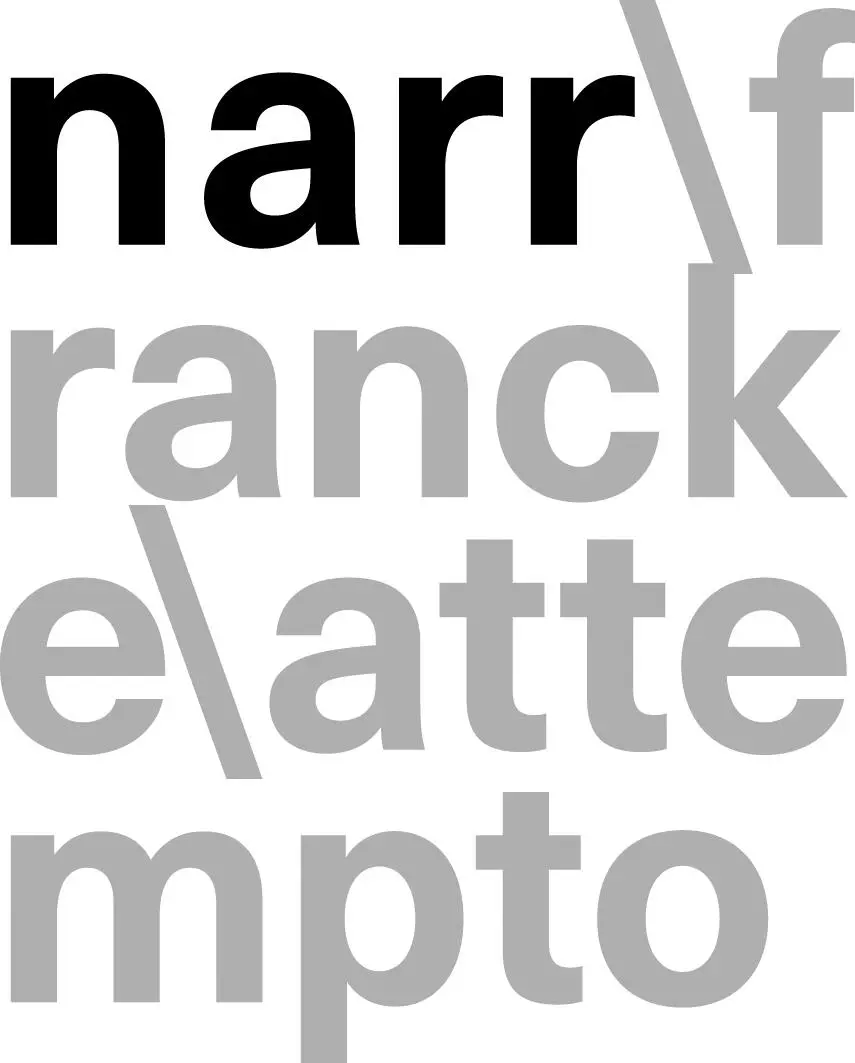
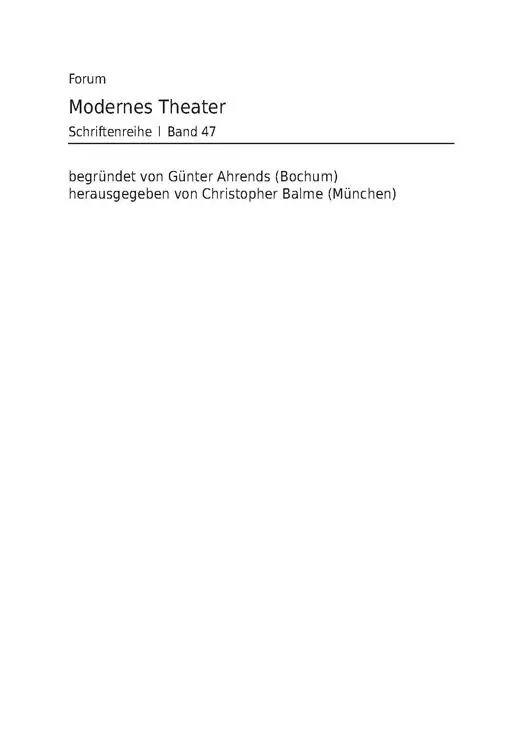
© 2016 • Narr Francke Attempto Verlag GmbH + Co. KG
Dischingerweg 5 • D-72070 Tübingen
www.francke.de• info@francke.de
Das Werk einschließlich aller seiner Teile ist urheberrechtlich geschützt. Jede Verwertung außerhalb der engen Grenzen des Urheberrechtsgesetzes ist ohne Zustimmung des Verlages unzulässig und strafbar. Das gilt insbesondere für Vervielfältigungen, Übersetzungen, Mikroverfilmungen und die Einspeicherung und Verarbeitung in elektronischen Systemen.
E-Book-Produktion: pagina GmbH, Tübingen
ePub-ISBN 978-3-8233-0029-8
Introducing Occupy Antigone: Tradition, Transition and Transformation Charlotte Gruber, Katharina Pewny, Luk Van den Dries, Simon Leenknegt The articles on Antigone collected in this anthology are based on contributions to the international conference Occupy Antigone: Tradition, Transition and Transformation,which took place on 18 and 19 March 2014 in Ghent, Belgium. This conference was funded by the Research Foundation – Flanders (FWO), Ghent University and the University of Antwerp. As part of the research-branch on contemporary tragedy within the Research Centre Studies in Performing Arts and Media (S:PAM) of Ghent University, the conference was organized by Katharina Pewny and Charlotte Gruber (both involved in the BOF-funded project Antigone in/as Transition, 2012–2016) in collaboration with Luk Van den Dries and the Research Centre for Visual Poetics of the University of Antwerp. Being a result of the conference, this anthology puts together some of today’s most relevant perspectives on the tragedy Antigonefrom a variety of different fields – in the first place perspectives with an outlook on the significance of the tragedy in terms of (especially contemporary) performance practice and theoretical reflections with regard to the notion of performativity. This anthology thus provides an interdisciplinary, cross-cultural approach to Antigonefrom a performance studies angle. In doing so, this specialized issue draws attention to what could easily be called a boom of the tragedy’s occurrence and relevance in both theatre spaces and academia, which unravelled ever since the turn of the millennium and has just taken on momentum again during the last five years. This is apparent in the multitude of very recent publications addressing Antigone in particular, such as The Returns of Antigone. Interdisciplinary Essays,1 Antigone, in Her Unbearable Splendor. New Essays on Jaques Lacan’s The Ethics of Psychoanalysis,2 and Whose Antigone? The Tragic Marginalization of Slavery.3 These were preceded by, for instance, Les Antigones contemporaines: de 1945 à nos jours,4 and Crossroads in the Black Aegean: Oedipus, Antigone, and Dramas of the African Diaspora.5 Hans-Thies Lehmann, one of the most influential figures in discourses on contemporary performance strategies, published a contribution to Tragödie – Trauerspiel – Spektakelin 2007,6 which preceded his extensive publication Tragödie und Dramatisches Theaterthat appeared in 2013.7 These publications demonstrate the overlooked relevance of tragedy in postdramatic theatre. In a chapter on what he calls “Das Modell Antigone” (not to be confused with the Antigonemodellby Bertolt Brecht), Lehmann has yet again assigned a special position to the figure of Antigone. It is Antigonewhom he calls “the embodiment of tragedy”.8 Occupy Antigoneelaborates on the neglect of the vast multitude of performances of Antigone, while at the same time providing a scholarly encounter between theory and theatre practice. This publication is hence located between – and inspired by – specialized anthologies such as Interrogating Antigone in Postmodern Philosophy and Criticism9 and Antigone on the Contemporary World Stage.10 These publications reveal a trend of radically rethinking the canonical classic and critically engage with the heritage and legacies formed by earlier interpretations. Within the German speaking humanities, and particularly under the influence of Georg Wilhelm Hegel’s influential interpretation, Antigonehad come to mark the conflict-laden transition from an ethics of the family and divine law to an ethics of the state and humanism.11 Since Hegel’s account, however, the myth of Antigoneand its essential dynamics have been read in a great number of ways rather contesting his position. In 1984, George Steiner published a versatile analysis of the Antigonemyth in various artistic, cultural and intellectual fields.12 Therein, the author describes Antigoneas “object of obsession from the end of the eighteenth century until the present”.13 In twentieth-century French academia, Antigone entered psychoanalysis mainly due to Jacques Lacan,14 whose emphasis on the heroin’s death-drive was later radically criticized by his former student Luce Irigaray.15 She accused Lacan of denying and undermining female desire and marked an important moment in early feminism. Hegel, Lacan and Irigaray have all been crucial influences on Judith Butler’s quintessential publication Antigone’s Claim.16 Butler, in contrast to Hegel, points out the linkages between the symbolic orders of language, the family and the state. Similar themes had been taken up before in the cryptic deconstructionist writing of the literary-philosophical text collage Glasby Jaques Derrida.17 It is interesting that in theory on Antigone (and Antigone in theory), particularly against the background of Butler’s and Derrida’s publications, the fields of psychoanalysis and philosophy seem to find an important meeting point. Since then, different proclamations of the notion of an ‘Antigone Complex’ played a role in publications by Cecilia Sjöholm18 and Bernard Stiegler,19 whose work frequently crosses the borders between philosophy and psychoanalysis. Occupy Antigoneinvestigates the vibrant life – since the beginning of this millennium – of a mythical figure that is after all more than 2500 years old. One of the earliest records of Antigone, mentioning her as being one of the daughters of Oedipus, is a fragment of Pherecydes of Athens that dates from around the beginning of the fifth century BCE.20 The first known tragedy in which Antigone appeared was Aeschylus’ Seven against Thebes, which probably premiered in 467 BCE.21 It is of course mainly due to the tragedy entitled Antigone, which Sophocles wrote around 441 BCE, that the figure became and remained important, especially on theatre stages. Besides the original text, famous twentieth-century adaptations, such as the one by Bertolt Brecht (1948) and those written by Jean Anouilh (1944) and Jean Cocteau (1922), continue to inspire today’s theatre makers. Performances that are built around the mythical figure of Antigone are hence an exceptionally rich and ever-growing field of research for performance analysis. First and foremost, there is an immense amount of material from the boom of re-stagings of ancient tragedies since the 1980s, and contemporary stagings of Antigoneare found in Europe, the Americas, Asia, Africa and India. Antigoneadaptations have, for example, told the story of the founding of the nation of Ghana (Edward Kamau Brathwaite’s Odale’s Chioce, Ghana, 1962) or critiqued the neo-colonialism at the turn of the century (Femi Òsófisan’s Tègònni, USA, 1994). The forbidden burial of one’s kin provides a point of departure for Latin American versions of Antigone, for example in Argentina and Peru, where civilians were abducted by military regimes in the second half of the twentieth century (Griselda Gambaro’s Antígona Furiosa, Argentina, 1986 and José Watanabe’s Antígona, Peru, 2000).
Читать дальше
